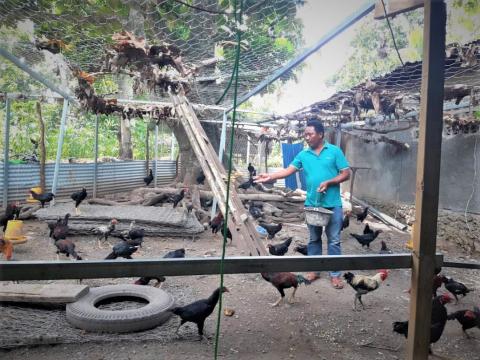Hernani succeeded in chicken rearing inspired by World Vision’s ANCP Better Food Better Health Project

“Later, I spoke with some of my neighbours who were selected as project beneficiaries and took some photos of the guidelines shared by World Vision and asked them about the rearing techniques they learned in training. After seeing what they did and learning more, I felt confident and decided to do it. I began to build the chicken coop sized one meter long on both sides. After finishing it, I bought one chicken and roosters and two hens in the market for a trial, and now I can proudly say that I succeeded”.
Lack of nutritious foods and poor knowledge on nutritional values in Baucau rural areas affects communities’ health status and leads to poor nutrition status, particularly in children, which in turn negatively affects their growth and development. To tackle this, World Vision through Better Food Better Health (BFBH) ANCP funded project is implementing chicken farming activity in Baucau municipality. This intervention aims at supporting poor and vulnerable households to improve chicken rearing and products to promote the consumption of chickens and eggs for enhancing the nutrition status of families, particularly children, pregnant and lactating women.
Hernani is well known in his community for his humbleness and is recognized as a hardworking man who strives for the wellbeing of his family. Even though he is not a selected beneficiary for the project, he got motivated by the experiences of his neighbours and the benefits of such activity for the family. Supported by his wife after only one year, Hernani expanded the chicken coop into two parts sized 9x6m² and 12x8m².
“The chicken rearing business is growing very well. I feed chickens twice every day with different types of foods such as corns, river tamarind, papaya, rice and moringa leaves and other chicken pellets.” said Hernani. After one year and a half, we have 183 chickens, including 82 roosters, 54 hens and 47 little chickens and eggs productions six times a year”. However, Hernani faced also challenges during the dry season and shortages on the usual feeding for chickens. So he tried to mitigate the situation by changing the feeding to grated coconuts and providing local vitamins to the chickens.
When he is not home, Hernani’s wife Augusta always supports her husband in the chicken rearing activities. “I look after the chickens when my husband is going out for work. Then, with a little help from my children, we feed the chicken, shower chicken roosters, move the eggs to the safe place, and bring the chickens back to the coops before sunset,” said Augusta while standing in front of her house with 11 years old daughter, Brígida. She also explains that her family is consuming eggs and chicken meat 3 or 4 times a week in various recipes prepared by her mother. Brígida happily added, “My mother makes eggs sandwich as school lunch for my siblings and me. Then, when I return from school, I like to see and play with little chickens before I start studying.”
Hernani uses most of the production for family consumption and some for selling. He does not need to go and sell in the market because he receives orders from vendors at his place (selling value ranges from $15,00 to $20,00). Also, Hernani and his wife grow rice and other crops in their own fields and rarely need to buy food in the market.
“World Vision continues to support communities in need and interested in chicken raising by providing them technique guidelines, vitamins, vaccines and other support needed”. Said Feliciano, BFBH project facilitator. World Vision observed that Hernani succeeded in his chicken farming even he is not a World Vision’s project beneficiary, but he can raise chickens very well based on the learning and techniques provided by WV as well as raise the number of chickens significantly within one and half year.
World Vision supports beneficiaries, including chicken coops equipment sized 5x6m, one rooster and ten chicken hens, pellets, chicken foods shredding machine, management training, vaccination, vitamins and herbals for livestock health. After two years, the household will revolve the same quantity to another household identified as the most vulnerable family to replicate the chicken farming activity.
From the result, three households have successfully revolved chickens to other vulnerable families, and other five non-beneficiaries like Hernani have adopted the same activity impacted by the World Vision project. World Vision expects that communities continue to revolve chickens to other households and apply the rearing techniques provided in the training to improve production, decrease malnutrition and earn a good income to meet their family needs.